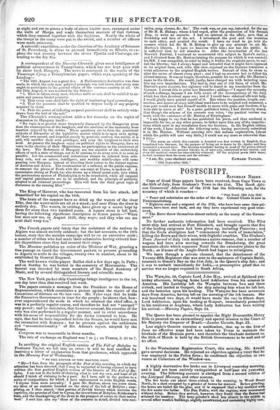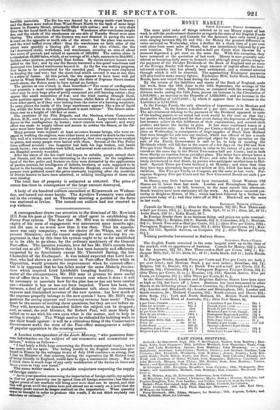A highly destructive fire broke out in Liverpool yesterday morning,
and it had not been entirely extinguished at half-past six yesterday evening. The following account is abridged from a second edition of the Liverpool Mercury, and other sources. The fire broke out about three o'clock in the morning, in Wood Street North, in a shed occupied by a grinder of bones for manure. Before grinding, the bones are boiled for the glue, and it is supposed that a boy meddled with the fire under the boiler. The Fire Police, with the engines, were summoned without delay. Before they arrived, hoarier, they found that the flames had attained the mastery. The bone-grinder's shed was situate it' the middle of several other wooden buildings, slightly conatructed, and containing highly corn.
bustible materials. The fire too was fanned by * strong north-west breeze; and the flames were wafted from Wood Street North to the back of some large houses in Formby Street, principally filled with cotton ; and in a very short time the fire burst forth in those buildings. Warehouse after warehouse caught fire, and the whole of the warehouses on one side of Formby Street were soon blazing. The attention of the firemen was now directed to saving the ware- houses on the opposite or north side of the street ; but the place was narrow, and the wind baffled every effort: thus the warehouses on both sides of the
street were speedily a blazing pile of ruins. At nine o'clock, the fire ba I destroyed sheds, workshops, and warehouses, covering an area of about two acres of ground, and valued at upwards of 500,000/. The cotton alone is estimated at 48,000 bales, which, at an average of 8/. a bale, amounts to 384,0001.; besides other produce, principally East Indian. By eleven sixteen houses were added to the list ; and by one the flames traversed a fire-proof warehouse and destroyed two bonded warehouses beyond it. As the fire was making progress, fear began to be entertained for the crowded gaol. Persons were employed in keeping the roof wet ; but the sbeet-lead which covered it was at one time in a state of fusion. At this period, the fire appears to have been well got under in Wood Street North ; and though the state of Neptune Street created much alarm, the flemes seem to have spread no further.
The picture at one o'clock is thus described—" The scene of conflagration row presents a most remarkable appearance. At short distances from each other may be seen huge piles of pertly consumed yet still burning cotton ; they appear like small mountains of firs; and the wind roaring through them, some portions appear like a blazing furnace, whilst flakes of fire are expelled from other parts, as if they were issuing from the crater of a burning mountain. Jo some places the inside of the large warehouses appears like a sea of liquid fire, whilst the heat in the neighbourhood is most intense." The flames some- times rose to a height of 150 feet or more.
The exertions of the Fire Brigade, and the Marines, whom Commander Bevan, R.N., sent to give assistance, were unceasing. Large water-tanks were ' drawn to the conflagration by horses ; water-courses were opened ; and every effort was made to supply labour and means to subdue the flames, or the die' aster must have been far greater.
Many persons were injured: at least seventeen human beings, who were en- gaged in working the engines, were either burnt or crushed to death in the ruins. The wall of a warehouse came down so suddenly, that two engines were crushed to pieces, and many people were buried with them. Several of the Fire Police force suffered severely : one Inspector had both his legs broken, and bands much burnt ; two constables were killed, and several were carried to the North- ern Hospital severely wounded.
After the alarm of the fire itself bad begun to subside, people missed their lost friends, and the scene was distressing in the extreme. In the neighbour- hood of the fire, police and firemen on duty were distracted by the applications of parties anxious for intelligence of fathers, brothers, or sons, supposed to be buried in the burning ruins. At the Northern Hospital, crowds of distracted persons were gathered round the gates anxiously inquiring after the condition of friends known to have been admitted, or seeking intelligence of those who were missing.
The total loss of property is estimated at 600,000/. The price of cotton has risen in consequence of the large amount destroyed.



























 Previous page
Previous page